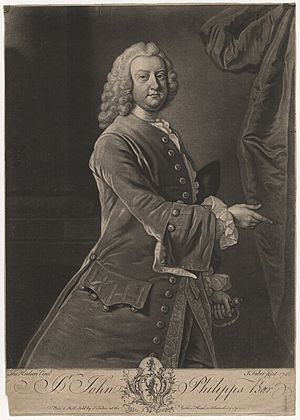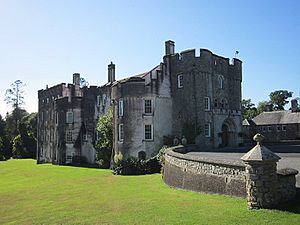Sir John Philipps, 6th Baronet facts for kids
Sir John Philipps, 6th Baronet (born around 1701 – died June 22, 1764), was an important Welsh politician and lawyer. He held the special job of Lord Lieutenant of Haverfordwest from 1761 to 1764. Sir John was the son of Sir John Philipps, 4th Baronet. He studied at Pembroke College, Oxford, and later trained to be a lawyer at Lincoln's Inn.
Contents
Early Life and Education
Sir John Philipps was born in the early 1700s. He came from a well-known family in Wales. His father was the 4th Baronet, which is a special title passed down through families, like a knight but inherited. John went to Pembroke College, Oxford, which is a famous university. After that, he went to Lincoln's Inn in London. This was a place where people studied to become lawyers.
Starting a Political Career
In 1736, Sir John Philipps started his public life. He was chosen as the mayor of Haverfordwest, a town in Wales. This was an important step in his career. A few years later, in 1741, he became a Member of Parliament (MP) for Carmarthen. An MP is someone elected to represent people in the country's government.
Becoming a Baronet
A sad event happened in 1743. Sir John's older brother, Sir Erasmus Philipps, 5th Baronet, died in an accident. Because of this, Sir John inherited the family title of Baronet. He also became the owner of Picton Castle, a large and historic family home.
Serving in Parliament
After inheriting the baronetcy, Sir John continued his work in politics. He stopped representing Carmarthen in 1747. However, he returned to Parliament later. He served as an MP for Petersfield from 1754 to 1761. Then, he represented Pembrokeshire from 1761 until his death in 1764. In 1763, he was given another important role. He became a Privy Counsellor, which meant he advised the King.
Supporting Education
Sir John Philipps cared a lot about education. He used his wealth to help students. He set up several scholarships at Pembroke College, Oxford, where he had studied. These scholarships helped young people go to university. In 1742, he was also chosen to be a Fellow of the Royal Society. This is a very old and respected group of scientists. His older brother had suggested him for this honor.
Family Life
In 1725, Sir John Philipps married Elizabeth Shepherd. She was the daughter of Henry Shepherd from London. They had four children together: one son and three daughters. The family lived for many years at a place called Norbiton Place. This estate was just outside a town called Kingston upon Thames.
Cesar Picton
One interesting person who worked for the Philipps family was Cesar Picton. He was a former slave from Senegal in Africa. After gaining his freedom, Cesar became a very successful coal merchant in Kingston upon Thames. This shows how some people connected to the Philipps family went on to achieve great things.
Later Years and Legacy
Sir John Philipps passed away at Norbiton Place on June 22, 1764. His son, Richard, took over the family title. Richard later became Baron Milford in 1776. Sir John is remembered for his work in politics and his support for education.
 | Emma Amos |
 | Edward Mitchell Bannister |
 | Larry D. Alexander |
 | Ernie Barnes |



